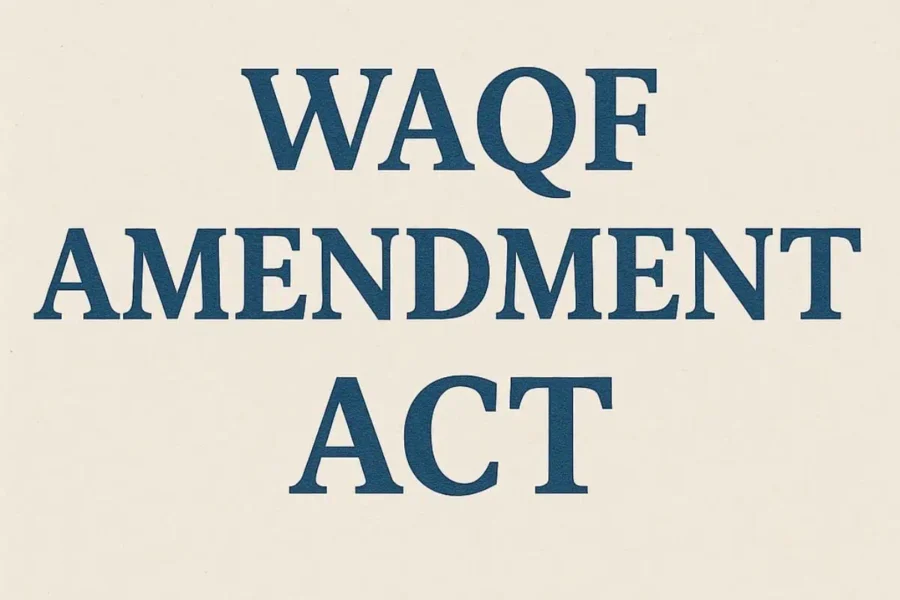The WAQF (Amendment) Act, 2025 was introduced in the Lok Sabha on 8th August 2024. It seeks to bring significant reforms to the governance and management of waqf properties in India. The Act aims to repeal the Mussalman Waqf Act, 1923, and amend the existing Waqf Act, 1995, which governs the administration of waqf properties. The new amended version will now be known as the United Waqf Management, Empowerment, Efficiency and Development Act, 1995 (UWMEED). This change signifies a new approach focused on better governance, inclusivity, and accountability.
Key Reforms in Waqf Formation
One of the major changes introduced through the amendment is in the process of creating waqf properties. The amendment removes the concept of “waqf by user”, meaning that just using a property as waqf over a long time would no longer be a valid claim. Waqf can now only be formed through a formal declaration and endowment by a donor. Furthermore, only practising Muslims for at least five years who own the property can make such a declaration.
The Act also introduces a gender-sensitive reform. In the case of waqf-alal-aulad (waqf created for the benefit of descendants), the declaration cannot deny inheritance rights to female heirs, which is a major step towards ensuring gender justice and equal rights under personal laws.
Clarification on Government Properties and Waqf Claims
Another significant reform is related to the treatment of government properties identified as waqf. The amendment gives a retrospective effect, meaning that any such property that was earlier claimed as waqf will now cease to be waqf property. This step addresses several controversies and disputes where government land was being claimed as waqf, causing hurdles in public infrastructure development.
To resolve such disputes, the collector of the district is empowered to investigate and submit a clear report to the state government. This ensures transparency and avoids arbitrary waqf claims over public land.
Changes in Determination and Survey of Waqf Properties
Previously, the power to decide whether a property is waqf or not resided with the state government. The amendment dilutes these powers and transfers them to a senior revenue collector, who will now conduct inquiries and make determinations. This move decentralizes authority and reduces political interference.
Additionally, the responsibility for conducting surveys of waqf properties—earlier done by specially appointed commissioners—is now entrusted to the collectors. This change aims to speed up pending surveys, as a large number of waqf properties across India are still unverified or not registered properly.
Restructuring the Central Waqf Council
The Central Waqf Council has been reconstituted under the amendment. Its membership has increased to 22, and importantly, two non-Muslim members are now to be included. The council must also include Members of Parliament, retired judges, scholars, and eminent personalities, regardless of their religion.
To enhance inclusivity and diversity, two Muslim women are to be mandatorily included in the Council. Moreover, representatives from Muslim organisations, community leaders, and scholars are to be given appropriate representation. This ensures that the council reflects a broad-based and democratic structure with a focus on transparency and balanced decision-making.
State Waqf Board Reforms
The composition of State Waqf Boards has also been significantly expanded to include 33 members. Members will be nominated by the state government, and representation from various Muslim sects, such as Shia, Sunni, Bohra, and Aga Khani, is ensured. Notably, the inclusion of two female members and two non-Muslim members promotes gender and religious inclusivity.
Waqf Tribunals and Appeal Mechanism
In response to a growing number of unresolved cases, the Act introduces expert-led tribunals. These are composed of a district judge as chairman and a joint secretary from the state government as a member. This measure seeks to resolve the backlog of over 40,951 cases related to waqf property disputes.
The amendment now allows appeals to the High Court within 90 days, providing a much-needed legal recourse that was earlier missing. Under previous versions, decisions of the Waqf Tribunal could not be challenged in higher courts, which had raised serious concerns about transparency and judicial accountability.
Issues in Earlier Legislation
- Several long-standing issues have plagued the waqf administration in India. One major issue is the doctrine of irrevocability; once a property is declared as waqf, it can never be taken back. This has led to conflicts, including high-profile disputes such as those related to Bet Dwarka islands. Courts have struggled with the legal principle that “once a waqf, always a waqf”, which often limits judicial flexibility.
- Moreover, widespread mismanagement and illegal occupation of waqf land have been persistent problems. Many waqf properties are not registered properly, or worse, are being misused, leased at below-market rates, or encroached upon. Due to a lack of oversight and inadequate reforms, the waqf system has suffered from corruption and inefficiency.
- Despite multiple efforts, comprehensive surveys of waqf lands are still pending. In states like Gujarat and Uttarakhand, surveys have not even started. In Uttar Pradesh, surveys ordered in 2014 are still not complete. Additionally, coordination between the Waqf Boards and Revenue Departments has been poor, causing delays in registration and confusion in ownership.
- Another alarming issue is the misuse of waqf laws, where some waqf boards have wrongly declared private property as waqf. This has triggered public resentment and numerous legal battles, questioning the credibility of the waqf administration.
- The constitutional validity of the Waqf Act itself has been brought into question. A PIL filed in the Delhi High Court argues that the Act is discriminatory, as it exclusively applies to one religion, while no equivalent laws govern religious endowments of other communities. This raises concerns about equality before the law under Article 14 of the Constitution.
Contributed by: Vanshika Dhiman (Intern)

